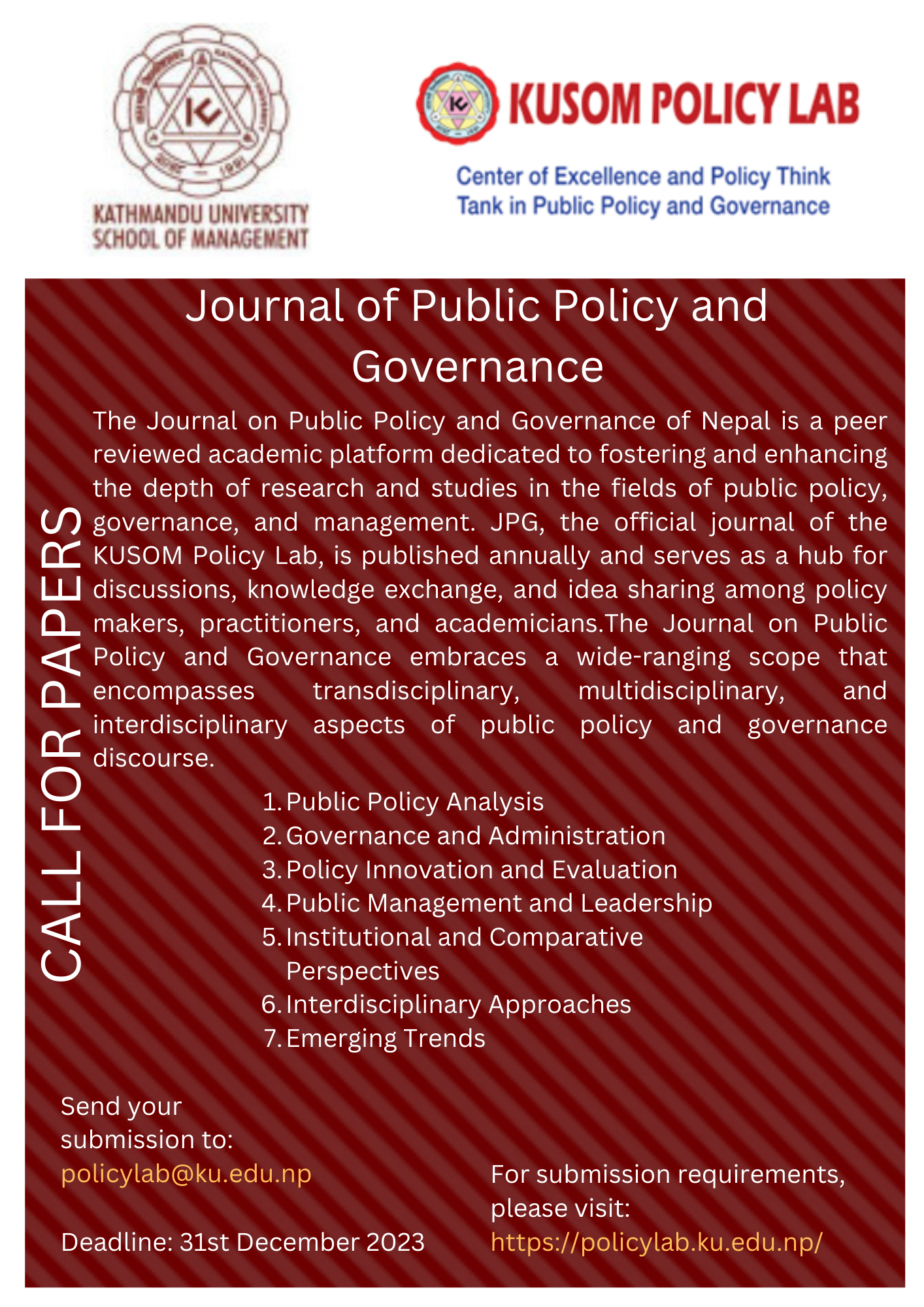The KU SOM Policy Lab (in short, Policy Lab) is the public policy think tank and a platform within Kathmandu University School of Management that aims to deal with public policy problems in Nepal in which specialist team, university students, and experts work in a creative space to analyze complex policies, evaluate them, and recommend policy reformation that is needed to serve the interest of the general public. At Policy Lab programs are designed to ensure that policy scholars and practitioners have the opportunity to tackle socially relevant and topical policy issues, understand the interests of stakeholders, and develop concrete solutions with a method of policy design based on an approach grounded in the field. During the process, the Policy Lab keeps the marginalized and underprivileged section of the community at the center of public debate, dialogue, and discourse.
The Policy Lab experiments with and proposes innovative ways to tackle burning issues of the community through policy reformation, and at the same time, it tries to reform and change the ways government performs. The Policy Lab stimulates people-centered design approaches to policy-making, facilitates an advanced exchange of ideas, builds trust, and becomes a catalyst for change in a regional and national arena.
The Policy Lab engages a large policy ecosystem of actors from the public and private sectors and the civil society, and encourages them to collaborate in order to address a practical policy issue relevant to the common good. It enhances connections between KU SOM and various public policy institutions in order to best serve the mainstream public institutions (ministries) and policy institutions (national planning commission, law commission, think tank) for evidence-based and informed policy decision making, policy reform, and public service delivery.
The team of researchers/scholars at Policy Lab works in coordination with various agencies, such as ministries, members of parliaments, bi-lateral, and multilateral organizations, diplomatic institutions, the Kathmandu University, and research institutions to enrich and broaden the horizon of the essence of “public policy” in the modern world and to spearhead the agenda of public policy and governance as a major tool for the economic development of Nepal. All these actors play an important role in the growth of Policy Lab. Its data-driven policy research, policy debates, policy development round-table workshops, and outreach events build bridges and channels to engage all the key voices and major players in public policy at the same table in creating tangible and measurable solutions to some of Nepal’s most challenging issues.
Furthermore, the Policy Lab provides policy teams with practical support to better understand the people they are trying to reach and work with them to co-design new solutions. Bringing together teams of researchers from multiple schools and departments at Kathmandu University, as well as from other institutions in countries across the globe, the Policy Lab focuses on core questions in a number of areas including innovation and growth, innovation and inequality, globalization and innovation, social innovation, new technologies and their impact on society, innovation in traditional industries, and arts and innovation. Since our aim is not only to design and test policies, we also pay attention to the role of public policy in nurturing innovation, while at the same time enhancing its positive impacts on society and limiting its negative consequences.
Objective
The main objective of the Policy Lab is to promote evidence-based policy formulation and implementation to tackle the burning issues of a diverse range so as to create a prosperous and just society. For the same, it aims at fostering a partnership between government agencies, ministries, diplomatic agencies, journalists, civil society organizations, academics, and business houses. It uses user-centric methods and competencies to test, experiment, and learn to develop new policy solutions.
In order to achieve objective, the KU SOM Policy Lab adopts the following strategies:
- Identify pertinent issues of the country and find the solution with interaction with different stakeholders to create a meaningful impact for citizens.
- Enable and promote policy innovation culture within the public sector and offer a platform for policy incubation and experimentation of human-centric ideas.
- Deliver new policy solutions through inspiring practical projects.
- Build the skills and knowledge of the policy profession and wider civil service.
- Provide a research environment and encourage young scholars to policy research
- Move beyond prototyping and testing it, design implementation strategies.
- Encourage researchers to exchange their insights and findings on different aspects of public policy and governance.
- Build Nepal’s next generation of policy leaders, through which the program aims to become the national voice of Nepal’s future policy.
- Improve standards of public policy initiatives by conducting research and publishing publications, analysis, and reports to different stakeholders.
- Develop and implement outreach strategies to engage relevant policymakers and other stakeholders in dialogue.
- Solicit feedback from and engage policymakers to better guide studies that have policy implications; and
- Provide coaching and communication training to make policy engagement effective.
Along with these objectives, the KU SOM Policy Lab attempts to bridge the gap between academic and mainstream public policy. It seeks to create a platform to learn, teach, support, and engage the community in policy formulation and its effective implementation. Its dedicated partnership with the Government of Nepal (via the Ministry of Federal Administration and General Administration) enables the Policy Lab to also engage directly with policymakers and implementers both at the federal and sub-national levels of government. Design thinking and human-centric innovation are the key methodological approaches of the Lab. Hence, the lab acts as the centre of excellence in policy governance and management in public affairs.

